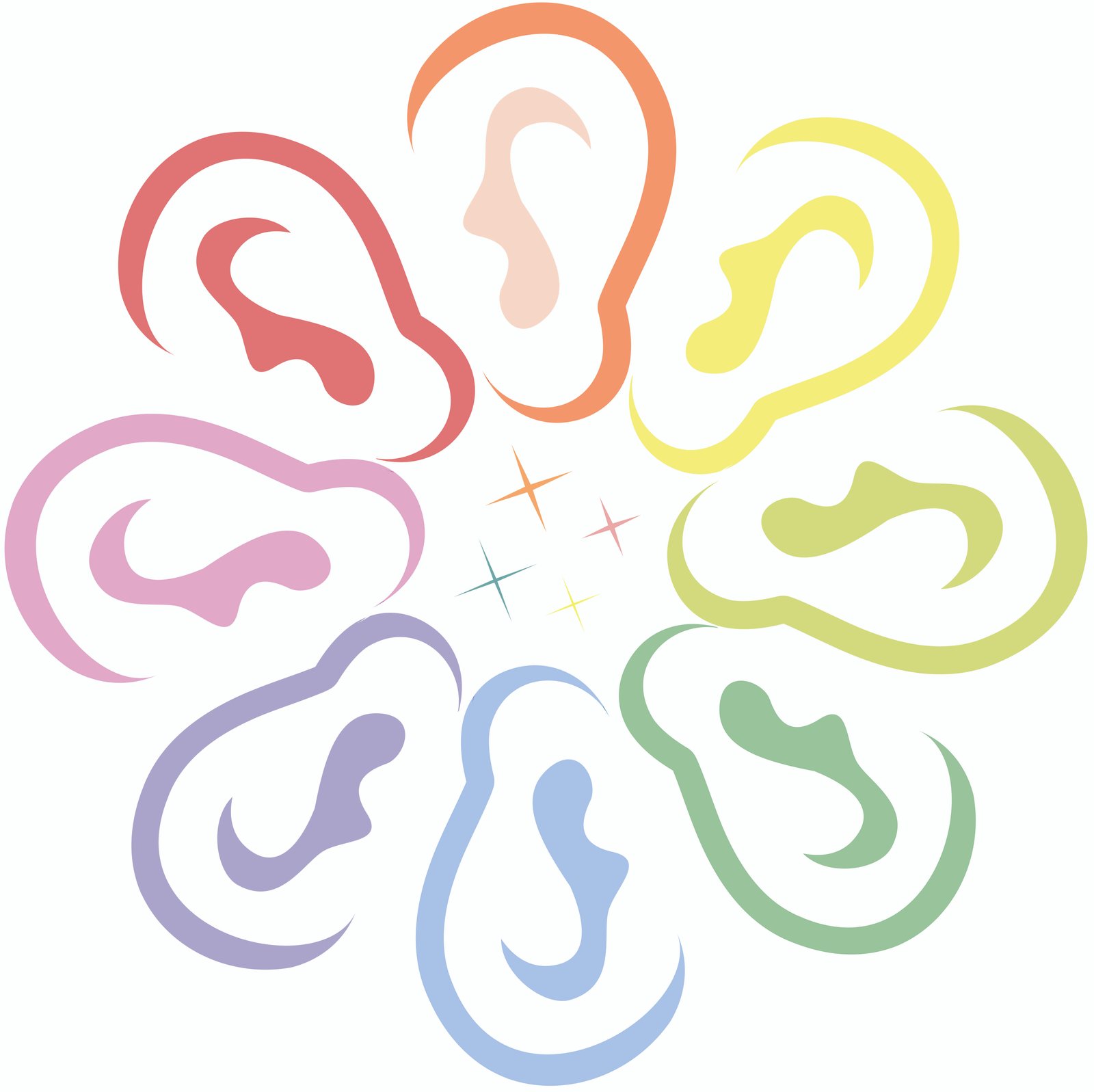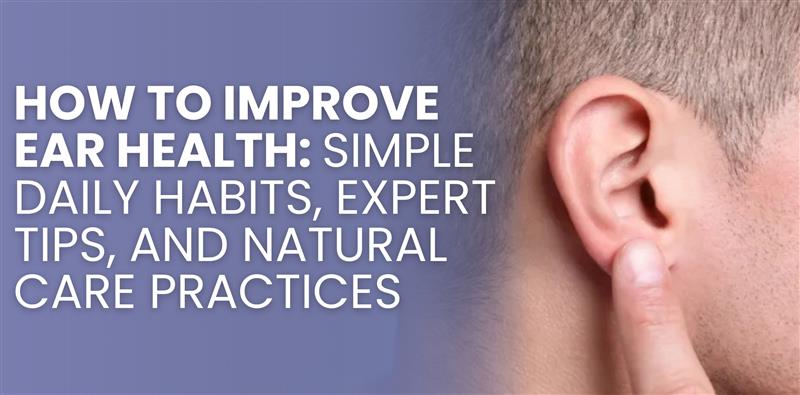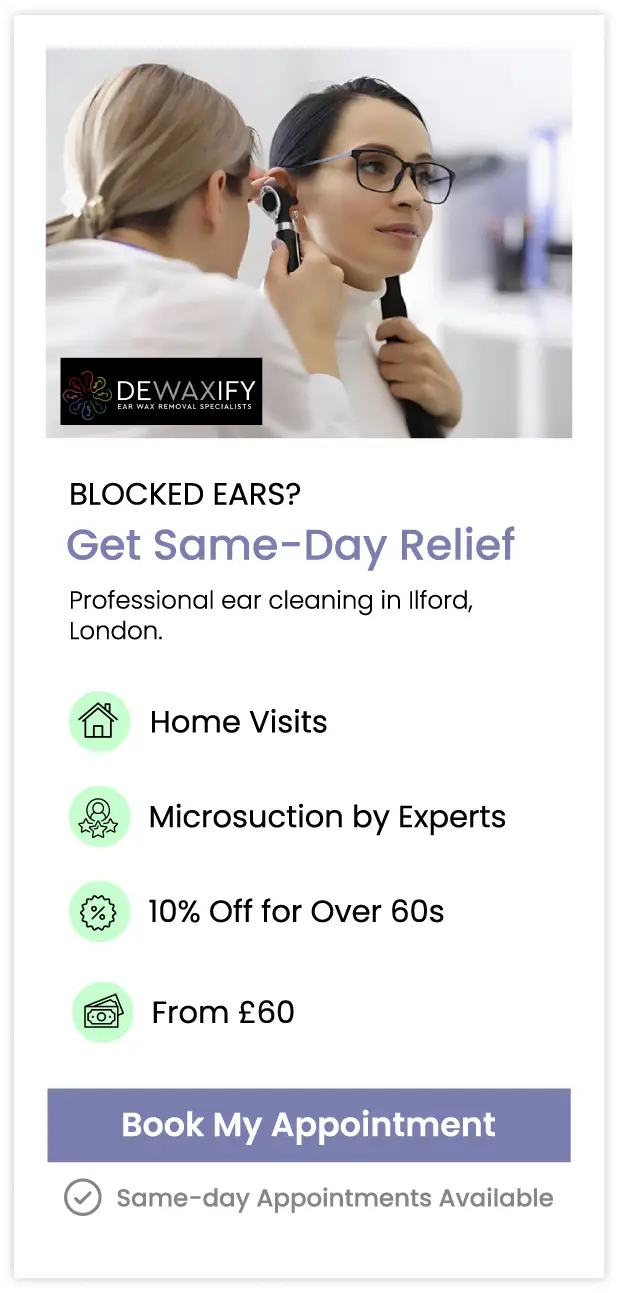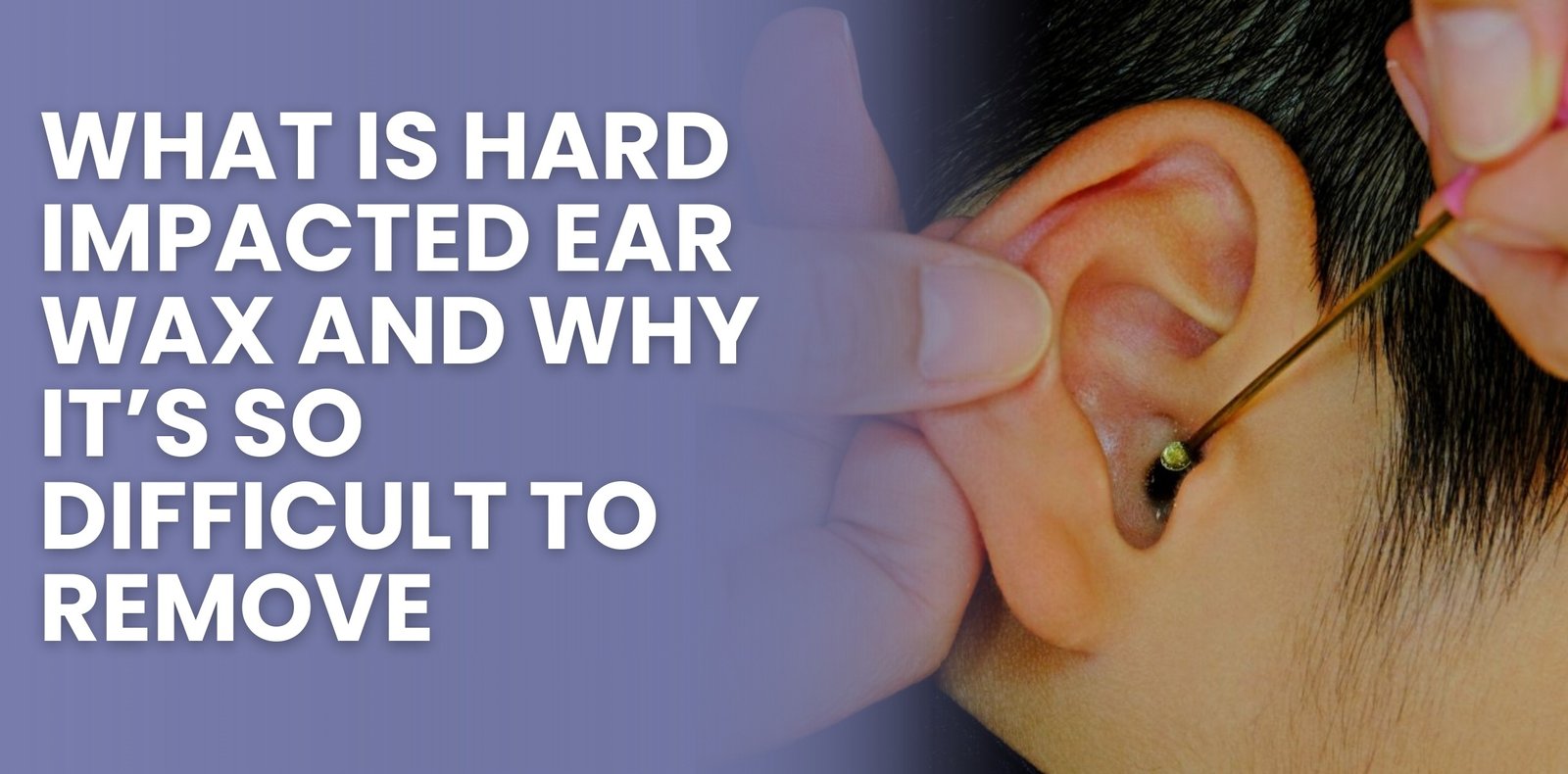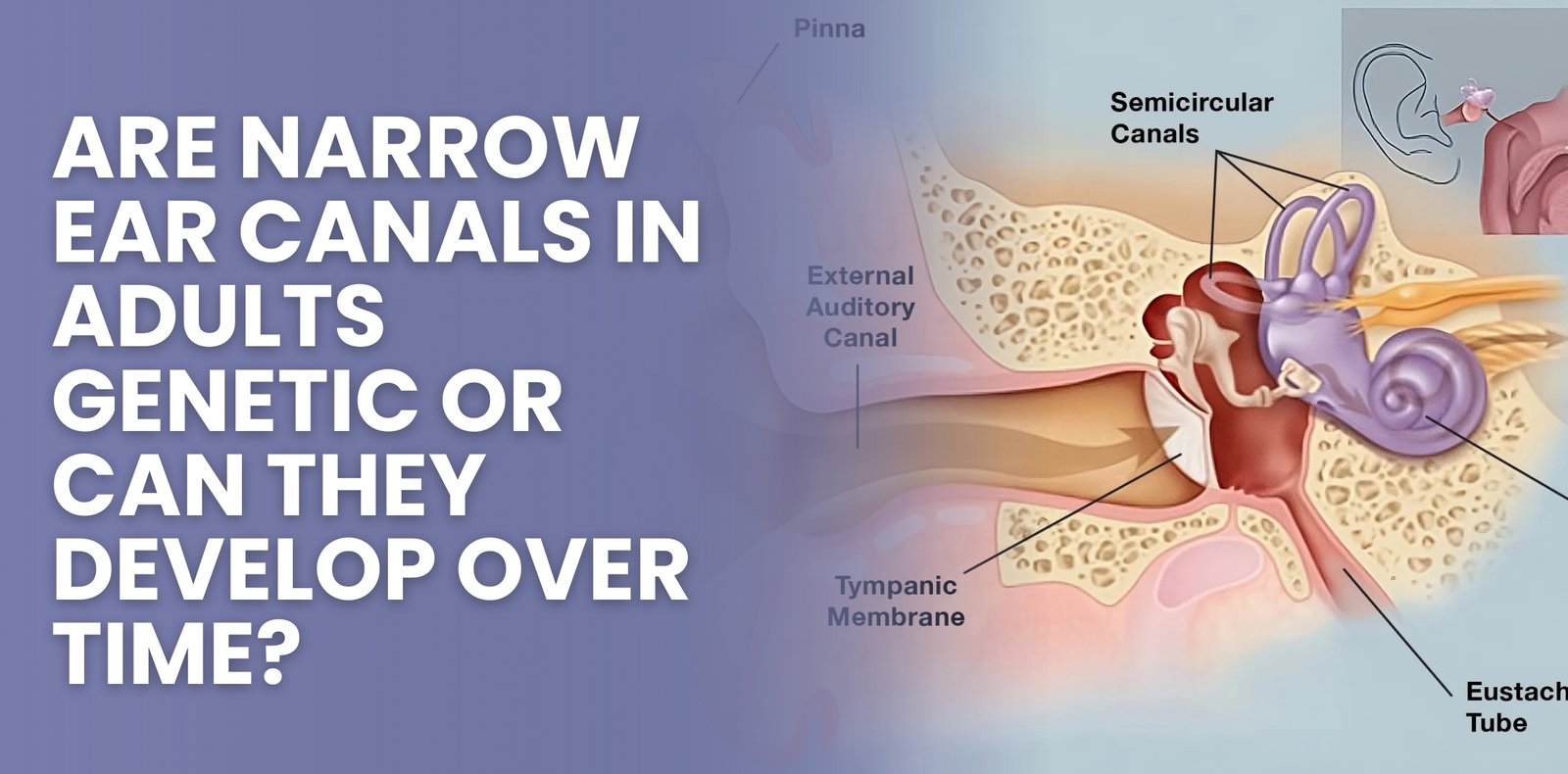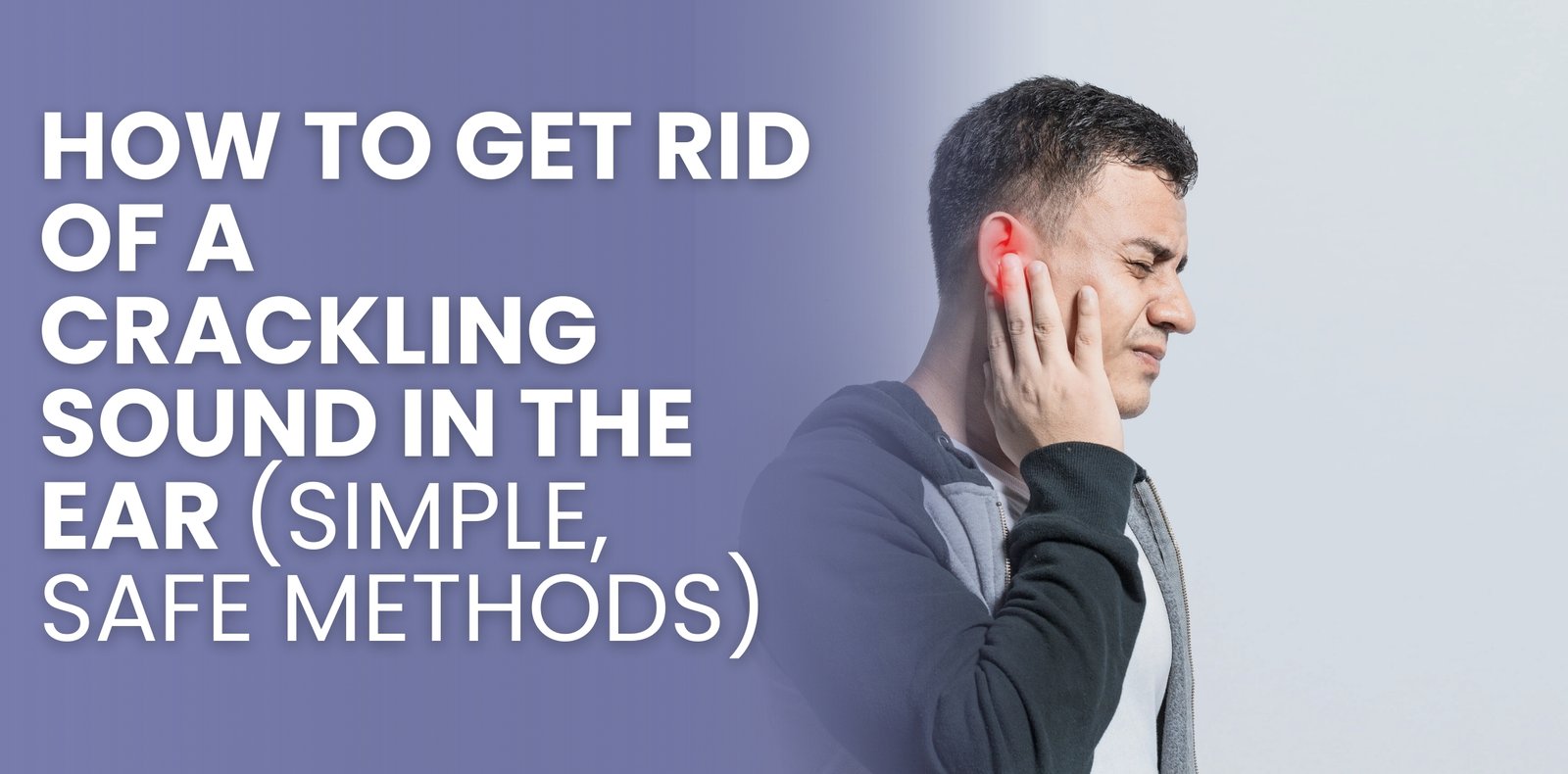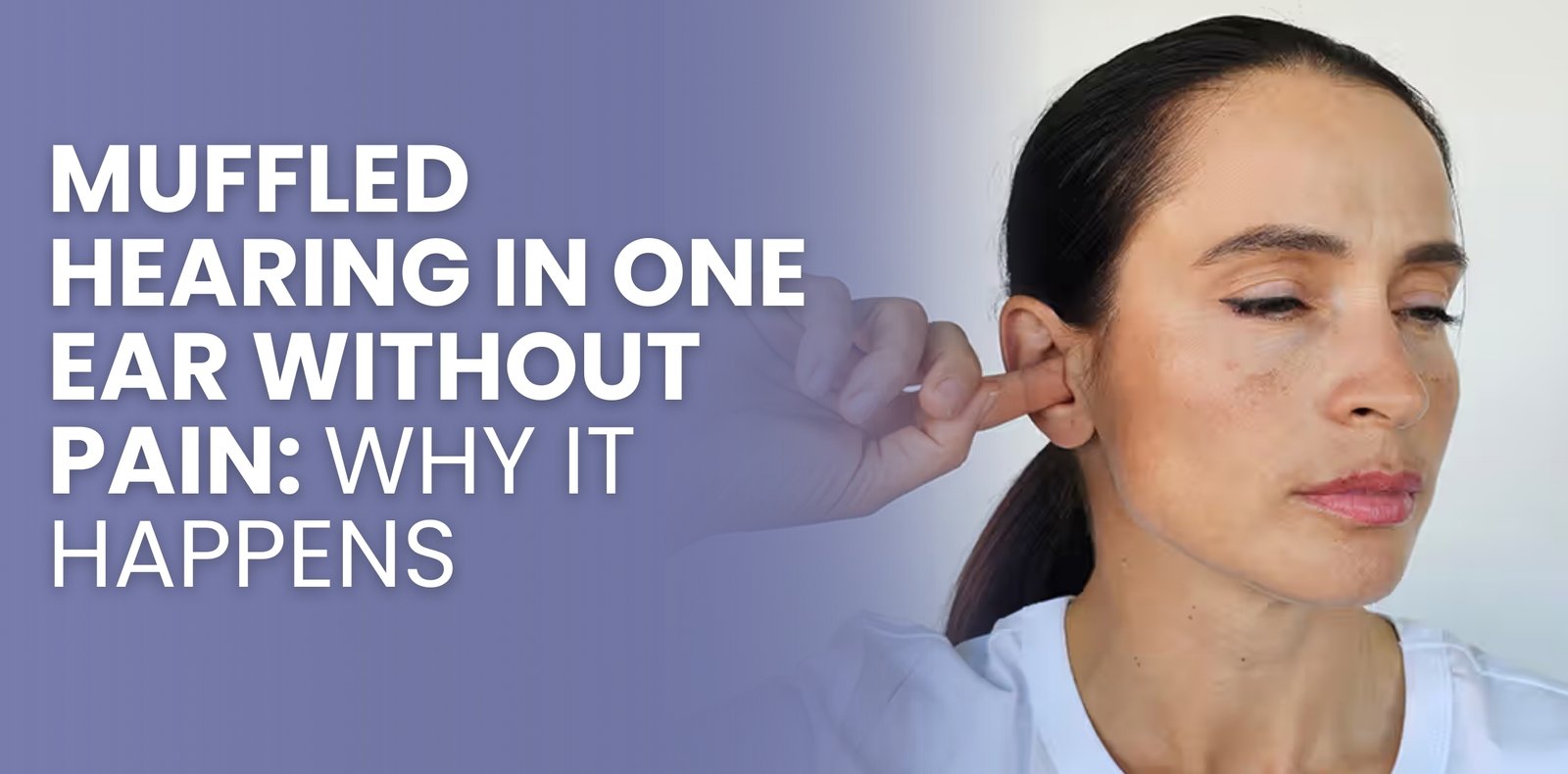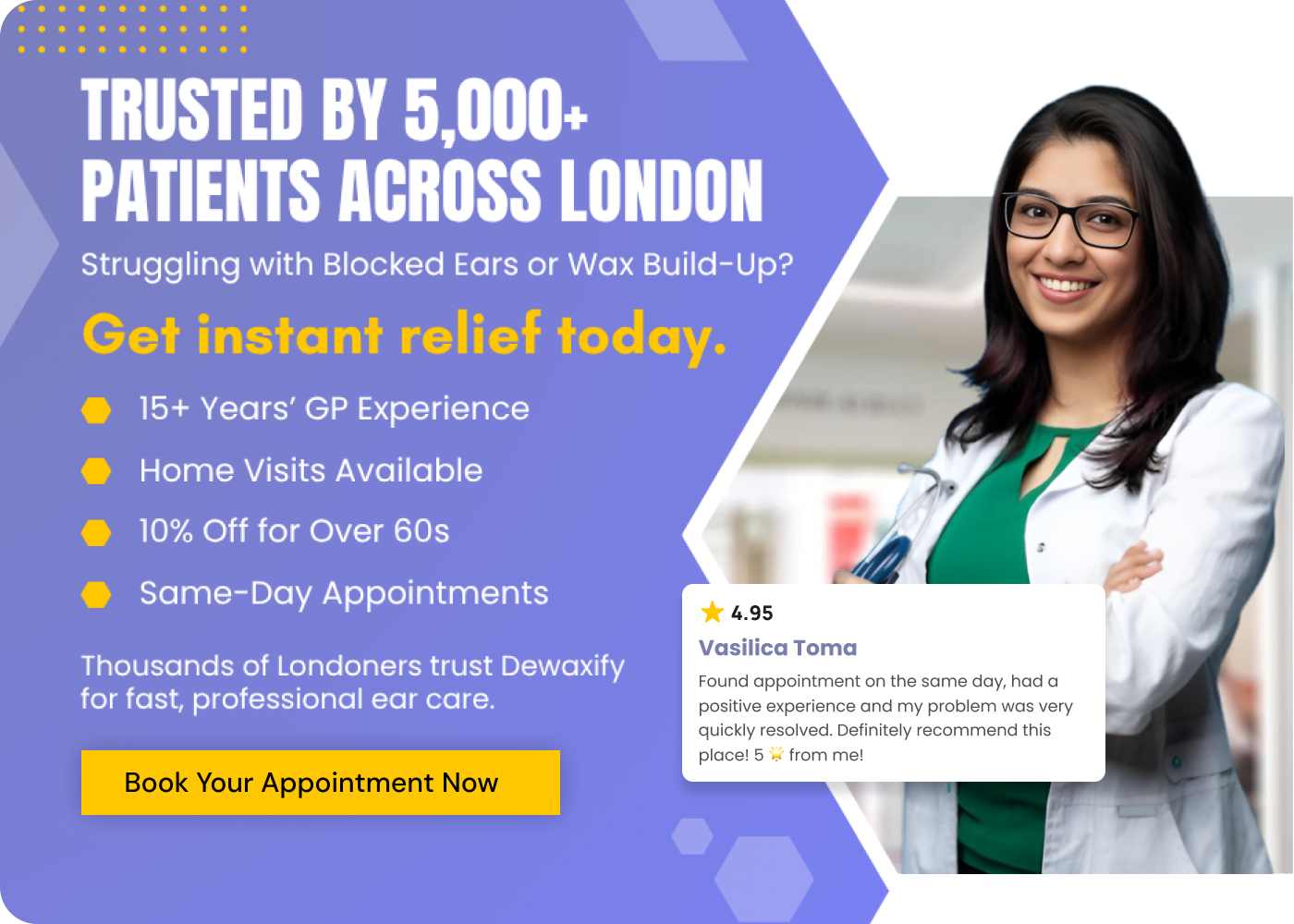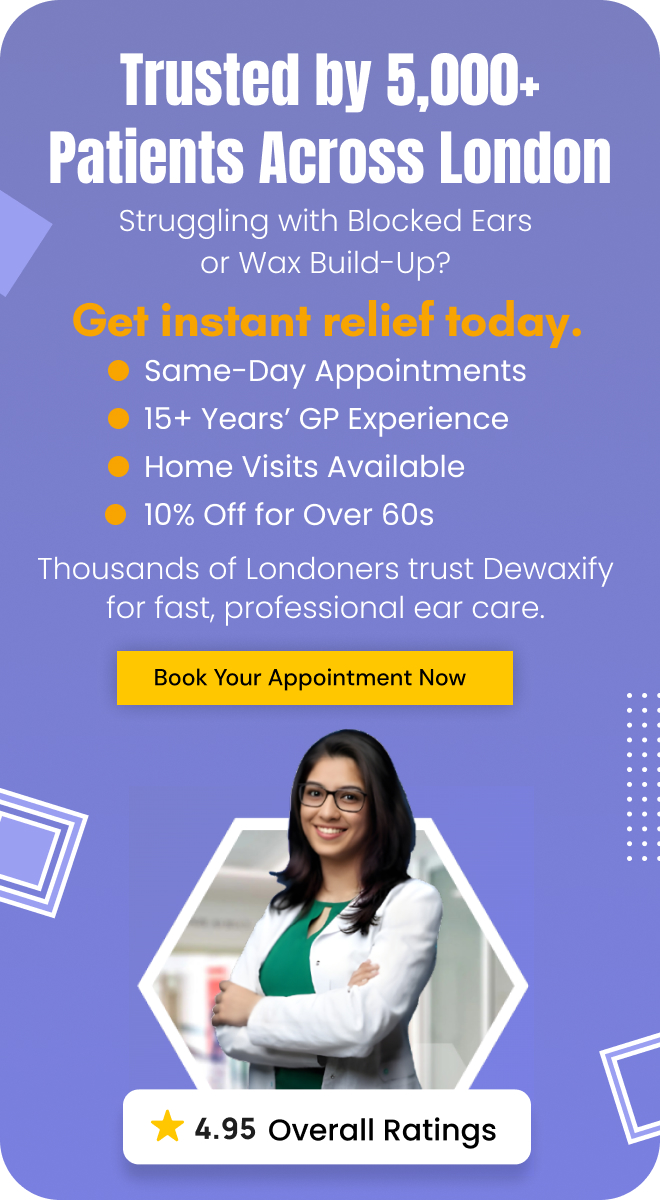Your ears are delicate, self-cleaning systems.
But modern habits can quietly damage them.
Loud music, constant earbud use, and skipped check-ups all take their toll.
The good news? You can improve your ear health with a few simple changes.
This guide will show you natural ways to protect and care for your ears.
You’ll discover daily habits, expert-backed tips, and when to seek professional help.
All brought to you by Dewaxify; London’s trusted ear health clinic..
Why Ear Health Deserves More Attention
Most people notice their ears only when they block, hurt, or ring.
But they work continuously, balancing, hearing, and filtering sound waves with remarkable precision.
The ear’s structure is composed of three parts that work in harmony:
- The outer ear collects sound and channels it inward.
- The middle ear transmits vibrations through three tiny bones.
- The inner ear converts these signals into electrical impulses for the brain.
Even mild neglect, such as prolonged headphone use, loud environments, skipped cleaning or improper use of ear wax removal kit can affect hearing over time.
Ear health influences not only hearing but also balance, concentration, and overall cognitive clarity.
Common Myths About Ear Health
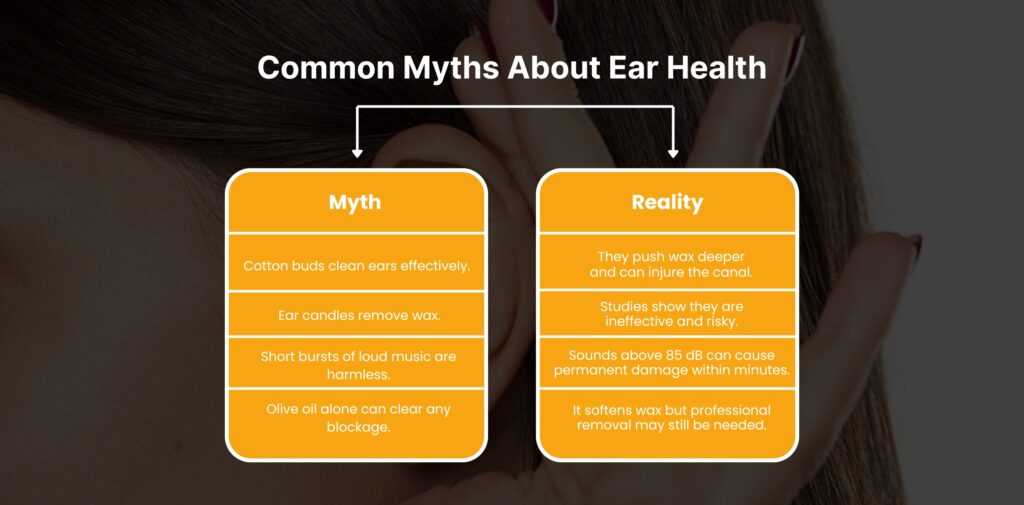
How to Improve Ear Health Naturally: Habits That Actually Work
Most ear issues are preventable.
With a few simple lifestyle changes, you can maintain clear hearing and prevent infections or blockages.
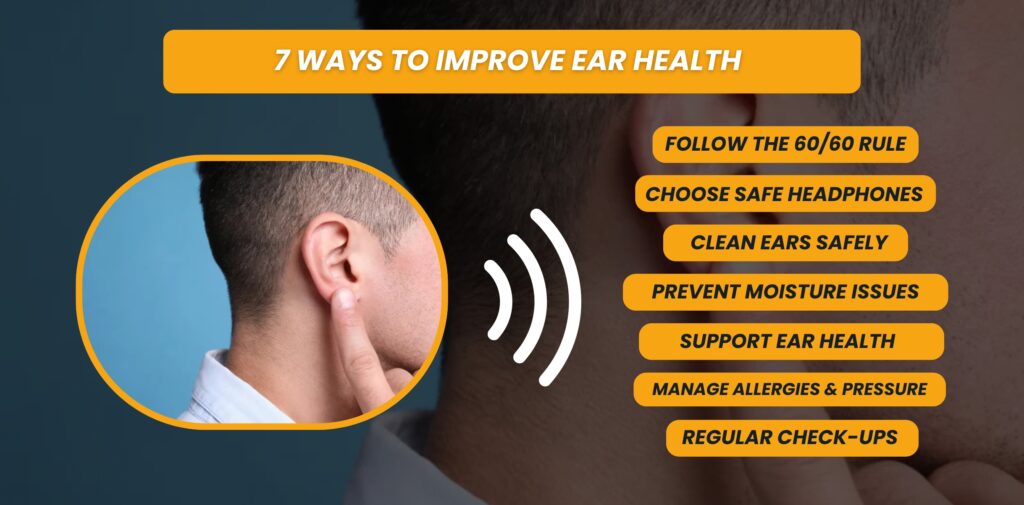
1. Follow the 60/60 Rule for Sound Safety
The easiest way to protect your ears is to limit exposure to loud sounds.
The inner ear’s sensory hair cells are fragile and cannot regenerate once damaged.
- Keep your volume at 60 percent or less.
- Limit listening sessions to 60 minutes at a time.
- Take short breaks after long sessions.
Use your phone’s volume and hearing features to monitor exposure levels and protect long-term ear health.
2. Choose the Right Headphones for Ear Health
We use headphones almost every day for music, calls, videos, or podcasts but few realize how much they can impact ear health.
Constant exposure to loud sounds or poorly designed earbuds can strain the ear canal and even cause gradual hearing loss.
That’s why choosing the right headphones matters.
Go for a pair that fits comfortably, doesn’t block airflow, and allows you to listen at a safe, moderate volume.
Over-ear or noise-cancelling headphones are often better choices, as they reduce the need to crank up the sound in noisy environments.
Best for Ear Health:
- Over-Ear Headphones (Closed-Back or ANC):
- Sit around your ears, not inside them, reducing pressure on the ear canal and allowing better airflow.
- They block outside noise, so you can listen at lower, safer volumes.
- Active Noise-Cancelling (ANC) Headphones:
- Use sound-cancelling technology to reduce background noise.
- This prevents the need to turn the volume up too high and protecting your hearing over time.
Moderate Use Only:
- In-Ear Earbuds:
- Compact and convenient, but can trap heat and push wax deeper into the canal.
- Use for shorter periods and give your ears regular breaks.
Avoid Prolonged Use:
- Low-Quality or Tight-Fitting Earbuds:
- Often lack proper noise isolation, making you increase volume.
- Tight seals can trap moisture and bacteria, leading to irritation or infection.
Clean your headphones weekly using a soft alcohol wipe and replace silicone tips every 2–3 months to prevent bacterial build-up.
This will be one of the simplest step towards improving your ear health.
ALSO READ>>>>>
The Truth About Ear Candling: Does It Work, Is It Safe, and Should You Try It?
3. Keep Ears Clean But Avoid Cotton Buds
The ear has a natural self-cleaning process that moves wax outward.
Cotton buds disturb this system and push wax deeper, increasing the risk of impaction.
- Clean only the outer ear with a soft cloth.
- If wax feels hardened, use 2–3 drops of medical-grade olive oil daily for 3–5 days.
- Avoid inserting any objects into your ear canal.
If symptoms persist, it is best to seek professional care, as there are many benefits of professional ear cleaning.
4. Manage Moisture and Prevent Swimmer’s Ear
Moisture trapped in the ear canal can promote bacterial growth, leading to irritation known as swimmer’s ear.
How to Prevent It:
- After swimming, tilt your head to each side to let water escape and towel dry gently.
- Use custom-fit swim moulds if you swim frequently.
- Avoid using tissues or hairpins inside the canal.
If your eardrum is intact, you can use an ear-drying solution or a mix of isopropyl alcohol and white vinegar to prevent moisture build-up.
5. Boost Inner Ear Health Through Nutrition and Circulation
Good hearing depends on healthy blood flow to the inner ear.
The cochlea relies on oxygen and nutrient-rich circulation to function properly.
- Eat foods high in magnesium, potassium, and omega-3 fatty acids such as spinach, salmon, bananas, and walnuts.
- Stay hydrated to maintain the fluid balance in your ears.
- Exercise regularly to improve blood flow.
Avoid smoking and limit caffeine, both of which constrict blood vessels and reduce oxygen supply to the ear.
6. Manage Allergies and Sinus Pressure
Blocked sinuses can cause fullness or temporary hearing changes by affecting the Eustachian tube, which connects the ear to the throat.
- Use saline nasal sprays or try steam inhalation to reduce congestion.
- Sleep with your head slightly elevated.
- Avoid blowing your nose too forcefully.
If you often feel popping or pressure in your ears, chew gum or yawn to help equalize air pressure naturally.
7. Schedule Regular Professional Check-ups
Even with proper care, wax build-up or age-related changes can occur.
A regular check-up ensures early detection of problems and helps maintain healthy hearing.

A 7-Day Plan to Improve Ear Health Naturally
| Day | Step | Why It Helps |
| 1 | Set your phone volume limit to 60%. | Protects against long-term hearing cell damage. |
| 2 | Switch to over-ear noise-cancelling headphones. | Reduces the need for high volume. |
| 3 | Clean or replace earphone tips. | Prevents bacterial growth and ear infections. |
| 4 | Use olive oil drops once daily for up to 3 days. | Softens hardened ear wax naturally. |
| 5 | Add magnesium-rich foods like spinach and almonds. | Improves circulation to the inner ear. |
| 6 | Take Dewaxify’s free online hearing test at /hearing-test. | Detects subtle hearing changes early. |
| 7 | Book a preventive microsuction session at Dewaxify. | Ensures long-term ear cleanliness and balance. |
Dewaxify: London’s Leading Ear Care Experts
Founded in April 2017 by Sita Parmar, a certified Audiological Scientist, Dewaxify is an ear wax removal clinic in Ilford, East London.
The clinic specializes in Microsuction Ear Wax Removal Service
This method is dry, precise, and highly effective.
It is considered the gold standard in modern audiology.
Dewaxify’s Expertise and Services
- Microsuction Technology: Uses a gentle suction device with magnification for high-precision ear wax removal.
- Comfortable and Fast: The process takes around 20 minutes
- Safe for All Ages: Suitable for patients with perforated eardrums or hearing aids.
- Comprehensive Consultations: Includes HD otoscopy, where you can view your ear canal on screen, followed by a free online hearing test.
SAME-DAY HELP AVAILABLE
Get Checked Today
Why Microsuction Complements Natural Ear Health
Microsuction is more than just wax removal.
It restores the ear’s natural self-cleaning rhythm.
For people with narrow canals or dense wax, it helps prevent recurring blockages.
Because the procedure is dry, it is safe for those with a history of ear surgery or infections.
Many patients describe the moment after microsuction as hearing “in high definition” again.
FAQs
Q1. Can diet alone improve inner ear health?
A healthy diet supports circulation and reduces inflammation, but it cannot reverse existing hearing loss. Combine nutrition with safe listening and regular check-ups.
Q2. How often should I clean my ears?
The ears are self-cleaning. Clean only the outer ear weekly and schedule microsuction every 6 to 12 months if you produce excess wax.
Q3. Are bone-conduction headphones safe?
Yes, they are suitable for awareness and moderate listening, though they may lack full bass quality. Ideal for outdoor use
Q4. Does microsuction hurt?
No. You may hear mild suction sounds, but it is quick and painless
Q5. Can children undergo microsuction?
Yes. Dewaxify’s paediatric audiologist treats children aged six and above safely.
